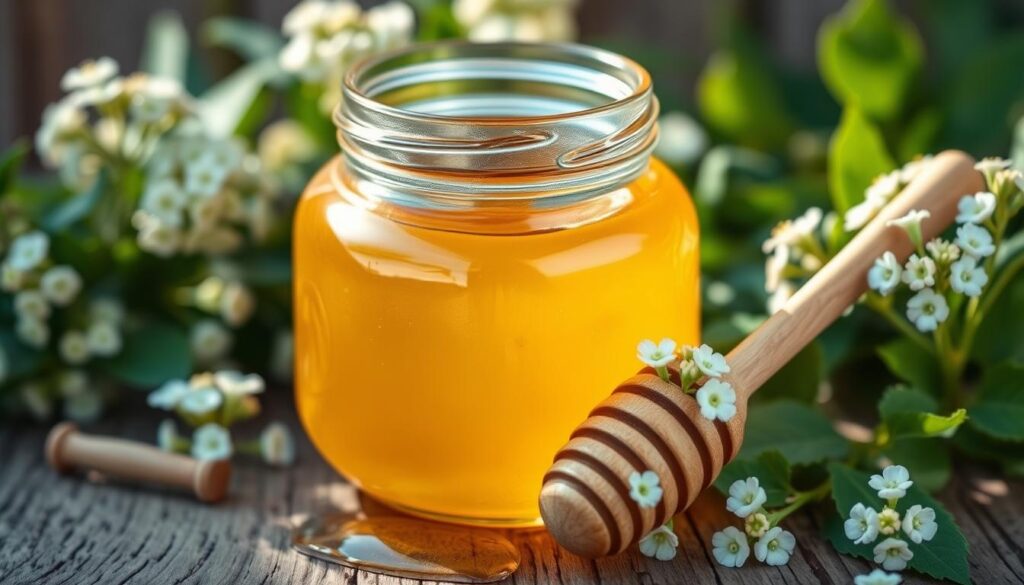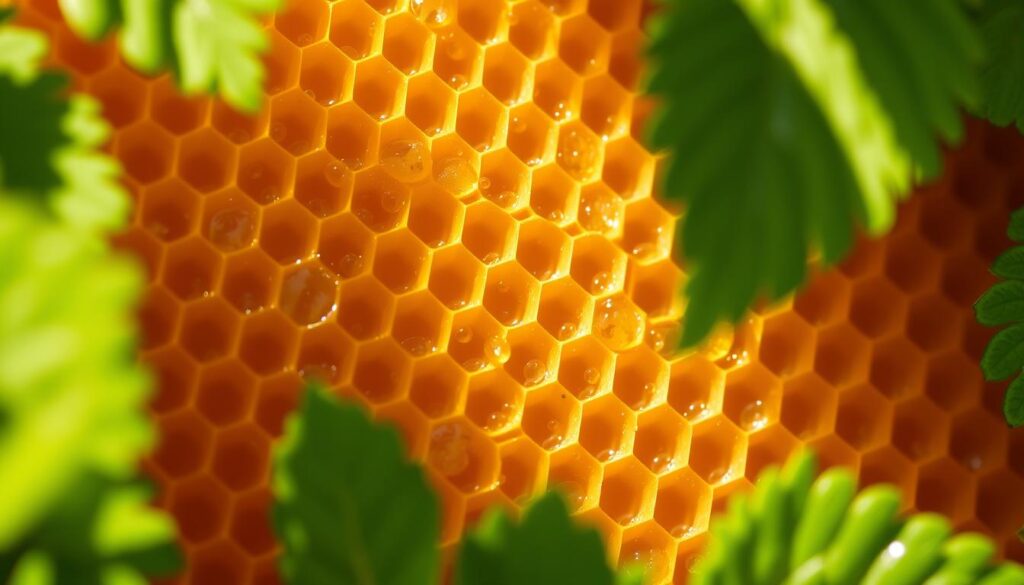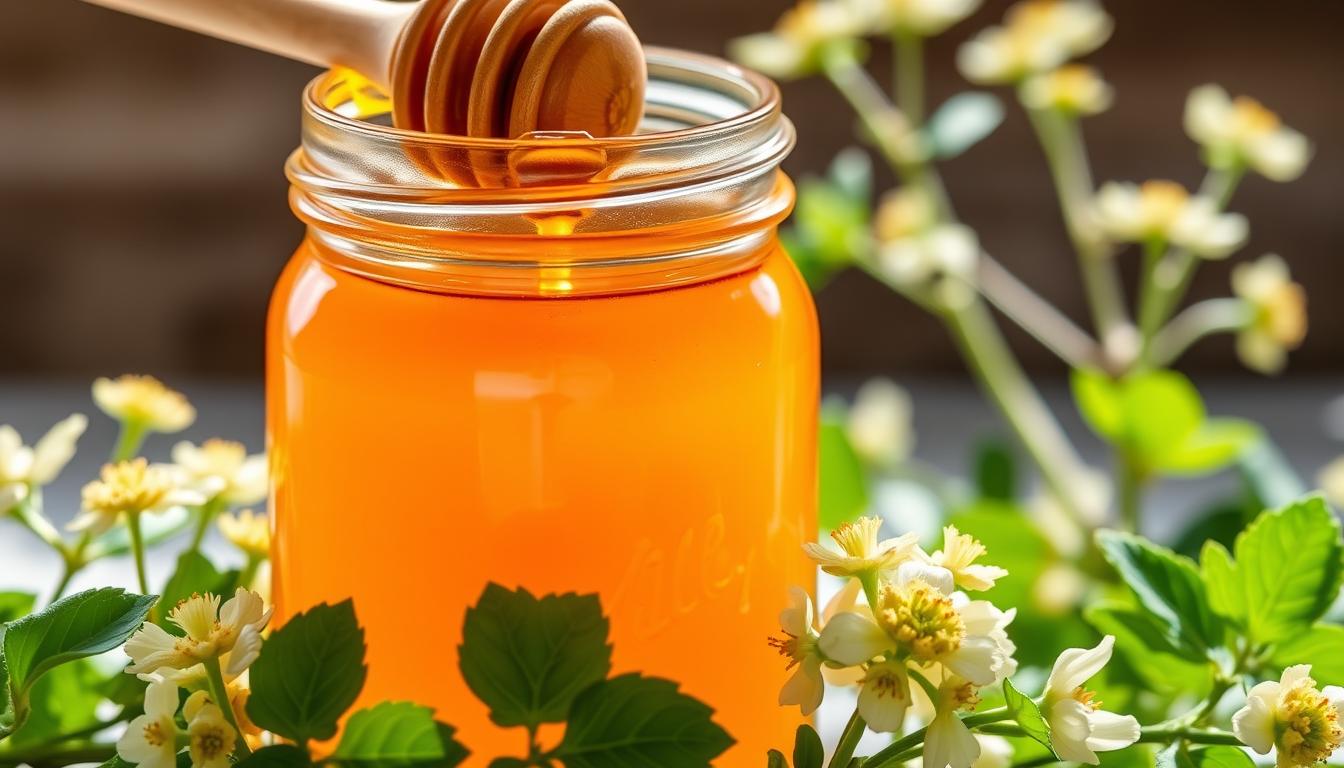Imagine a sweetness so pure, so divine, that it seems to capture the essence of the very flowers from which it was harvested. This is the allure of clover honey, a premium, artisanal nectar that has long captivated the hearts and taste buds of honey enthusiasts around the world. But what is it about this golden elixir that sets it apart? Prepare to embark on a journey of discovery as we uncover the unique qualities, versatile culinary applications, and sustainable beekeeping practices that make clover honey a must-have for any kitchen.
Key Takeaways
- Clover honey is a premium, artisanal honey with a pure, sweet flavor.
- It is derived from the nectar of clover flowers, offering a unique taste profile.
- Clover honey is prized for its numerous health benefits and versatile culinary uses.
- Sustainable beekeeping practices ensure the protection of local bee populations.
- Identifying authentic, high-quality clover honey is essential for enjoying its full range of benefits.
What secrets does this golden nectar hold, and how can it transform your culinary experiences? Dive into the world of clover honey and uncover the answers that will leave you captivated by nature’s sweetest gift.
What is Clover Honey?
Clover honey is a unique and prized variety of honey, known for its distinct floral origin and delightful flavor profile. Produced by industrious bees that gather nectar from the delicate blossoms of clover plants, this monofloral honey is a true testament to nature’s bounty.
Floral Nectar’s Sweet Transformation
The journey of clover honey begins with the bees’ tireless work. They meticulously collect the sweet nectar from clover flowers, a process that requires skill and precision. Through their intricate process of enzymatic transformation, the bees then convert the floral nectar into the golden, viscous liquid we know as clover honey.
A Delightful Flavor Profile
The resulting clover honey is known for its light, mild, and delicate flavor profile. This subtle sweetness makes it a versatile ingredient in the kitchen, suitable for a wide range of culinary applications. Whether drizzled over fresh fruit, stirred into tea, or used in baking, clover honey consistently delights the taste buds with its natural, pure flavors.
| Characteristic | Description |
|---|---|
| Color | Light golden to pale amber |
| Aroma | Subtle, floral, and slightly grassy |
| Taste | Mild, delicate, and pleasantly sweet |
| Texture | Smooth and creamy |
“Clover honey is a true masterpiece of nature, crafted by the dedicated efforts of our hardworking bees.”
The Benefits of Clover Honey
Clover honey is renowned for its exceptional health benefits. This golden nectar is a rich source of antioxidants, vitamins, and minerals that can support overall well-being. Numerous studies have shown that clover honey may help boost the immune system, aid in wound healing, and even possess anti-inflammatory properties.
One of the primary advantages of clover honey is its natural energy-boosting properties. Unlike processed sweeteners, this pure honey provides a steady and sustained source of energy, making it an ideal choice for active individuals or those seeking a healthier alternative to traditional sugars.
Furthermore, clover honey is a versatile ingredient that can be incorporated into a wide range of culinary applications. From drizzling it over pancakes or yogurt to using it as a sweetener in baked goods, this local honey can add a delightful flavor profile to any dish while offering a host of nutritional benefits.
For those seeking a more natural and sustainable approach to their health, clover honey stands out as a remarkable choice. Its raw and organic properties make it a superior alternative to processed sweeteners, providing a wholesome and nourishing option for health-conscious consumers.
| Nutrient | Concentration in Clover Honey |
|---|---|
| Antioxidants | High |
| Vitamins | C, B6, niacin, riboflavin |
| Minerals | Calcium, copper, iron, magnesium, phosphorus, potassium, zinc |
| Amino Acids | Proline, arginine, glutamic acid |
The versatility and health benefits of clover honey make it a true superfood that deserves a place in every health-conscious household. Whether drizzled over breakfast, used in baking, or enjoyed on its own, this natural sweetener is a delightful way to nourish your body and support your overall well-being.
“Clover honey is a versatile and nutritious sweetener that can enhance both the flavor and the health benefits of a wide range of dishes.”
Clover Honey’s Role in Sustainable Beekeeping
The production of clover honey plays a vital role in promoting sustainable beekeeping practices. Beekeepers who specialize in clover honey contribute to the well-being of local bee populations by supporting their foraging needs and maintaining a thriving ecosystem.
Supporting Local Bee Populations
By cultivating clover fields, beekeepers ensure a plentiful and reliable source of nectar for local bees. This not only benefits the bees but also helps to sustain honey production on the bee farm. The symbiotic relationship between beekeepers and bees is crucial for the long-term health and resilience of both.
Environmentally Friendly Practices
In addition to supporting local bee populations, beekeepers who focus on clover honey often employ environmentally friendly methods in the extraction and processing of their honey. This includes the use of natural and organic techniques that minimize the impact on the surrounding environment. The result is a high-quality, organic honey that consumers can trust and enjoy.
By embracing sustainable beekeeping practices centered around clover honey, beekeepers are not only contributing to the preservation of local ecosystems but also ensuring the long-term viability of their honey production and the bee farm as a whole.
Harvesting and Extracting Clover Honey
Beekeepers play a crucial role in the cultivation and extraction of premium clover honey. This delicate process requires meticulous care and expertise, as the flavorful nectar must be handled with the utmost precision to preserve its natural purity and sweetness.
The Beekeeper’s Craft
Experienced beekeepers closely monitor the bloom cycle of clover flowers, carefully assessing the optimal time to harvest the honey. Using specialized equipment, they gently remove the honeycomb frames from the bee farm, ensuring minimal disturbance to the colony.
The next step involves the extraction process, where the honey is carefully removed from the comb and filtered to maintain its exceptional quality. This process is a true testament to the beekeeper’s artistry, as they strive to preserve the delicate flavors and aroma of the clover honey.
| Key Steps in Clover Honey Extraction | Description |
|---|---|
| Comb Removal | Carefully removing the honeycomb frames from the hive |
| Honey Extraction | Extracting the honey from the comb using specialized equipment |
| Filtration | Filtering the honey to remove any impurities and preserve its purity |
| Packaging | Carefully bottling the clover honey to ensure freshness and quality |
The result of this meticulous process is a truly exceptional clover honey that captures the essence of nature’s bounty, ready to be enjoyed by discerning consumers.
Clover Honey in the Kitchen
Clover honey is a versatile ingredient that can elevate a wide range of culinary creations. Its mild, delicate flavor makes it an excellent choice for sweetening beverages, baked goods, marinades, and dressings. Whether you’re drizzling it over yogurt, pancakes, or simply spreading it on toast, clover honey adds a touch of natural sweetness that complements a variety of dishes.
Versatile Culinary Applications
Aside from its delightful taste, clover honey also possesses unique properties that make it a valuable addition to the kitchen. Its ability to caramelize and enhance the flavors of savory dishes is particularly noteworthy. Clover honey can be used as a glaze for roasted organic vegetables, a marinade for grilled meats, or a sweetener in local salad dressings.
The honeycomb itself can also be savored as a delicacy, offering a unique textural experience. When paired with cheese, raw honey can create a harmonious balance of flavors, making it an ideal addition to charcuterie boards or as a standalone snack.
| Culinary Application | Suggested Uses |
|---|---|
| Baked Goods | Sweetener in breads, muffins, and pastries |
| Beverages | Honey-based tea, coffee, lemonade, and smoothies |
| Savory Dishes | Marinades, glazes, and dressings |
| Cheese Pairings | Charcuterie boards and cheese plates |
Embrace the versatility of clover honey and explore its endless culinary possibilities. From sweetening your favorite beverages to adding a unique touch to your savory creations, this natural treasure can elevate any dish to new heights of flavor.
Choosing High-Quality Clover Honey
When selecting clover honey, it’s essential to identify authentic, high-quality products that deliver the full benefits of this natural sweetener. Several factors come into play when choosing the best clover honey for your needs.
Identifying Authentic Products
The first step in selecting premium clover honey is to look for visual cues that indicate authenticity. Clover honey typically has a light, golden color and a smooth, creamy texture. The aroma should be delicate and floral, with a subtle sweetness. Avoid honey that appears overly thick, crystallized, or has an off-putting odor, as these may be signs of adulteration or improper processing.
It’s also important to consider the beekeeper’s reputation and any certifications they may hold. Look for local honey producers who are transparent about their practices and can provide information on the source of their clover honey. Organic honey certification can further assure you that the honey was produced without the use of synthetic chemicals or pesticides.
“Choosing raw, unprocessed clover honey is often the best way to enjoy the full spectrum of beneficial compounds and natural flavors.”
By paying attention to these details, you can be confident that you’re purchasing authentic, high-quality clover honey that meets your personal and culinary preferences.

Raw vs. Processed Clover Honey
When it comes to the world of clover honey, the distinction between raw and processed varieties lies in the level of processing the honey undergoes. Raw clover honey is minimally processed, retaining its natural enzymes, pollen, and other beneficial compounds. This preservation of the honey’s natural state often results in a richer, more robust flavor profile that many enthusiasts find irresistible.
On the other hand, processed clover honey may undergo various methods of filtration, heating, or other treatments that can potentially strip away some of the honey’s nutritional value and alter its original flavor. While both raw and processed clover honey can be delicious, the preference often comes down to the individual’s taste and desire for a more natural, unaltered product.
| Characteristic | Raw Clover Honey | Processed Clover Honey |
|---|---|---|
| Processing | Minimally processed, retaining natural enzymes and pollen | May undergo filtration, heating, or other processing methods |
| Flavor Profile | Richer, more robust flavor due to preservation of natural compounds | Flavor may be altered or muted by processing |
| Nutritional Value | Retains more of the honey’s natural beneficial compounds | May have reduced nutritional value due to processing |
Ultimately, the choice between raw and processed clover honey, raw honey, or organic honey often comes down to personal preference and the desired flavor and health benefits. Whether you opt for the pure, unaltered taste of raw clover honey or the more refined profile of processed varieties, each offers a unique and delightful culinary experience.
“The true flavor of honey is best experienced in its raw, unprocessed form, where nature’s subtle complexities shine through.”
The Honeycomb: A Delicacy in Itself
Beyond the liquid clover honey, the honeycomb itself can be savored as a delectable treat. The comb, crafted from beeswax, contains not only the sweet raw honey but often small fragments of pollen and propolis as well. Indulging in the honeycomb offers a unique textural experience, allowing you to enjoy the organic honey in its most pure and natural form.
Whether spread generously on freshly baked bread, artfully arranged on charcuterie boards, or consumed on its own, the honeycomb is a true treasure trove for honey enthusiasts. Its distinct flavor profile and satisfying crunch can elevate any culinary creation, adding a touch of rustic elegance and natural sweetness.
“The honeycomb is a window into the incredible work of honeybees, a testament to the wonders of nature’s engineering and the pure, unadulterated goodness of clover honey.”
Savoring the Comb
Enjoying the honeycomb is a sensory experience that allows you to savor the honey in its most authentic form. The beeswax comb provides a delightful contrast to the silky raw honey, creating a unique textural interplay that tantalizes the palate. Whether you choose to nibble on a piece of the comb or let it melt slowly on your tongue, the experience is truly one-of-a-kind.

| Honey Comb Attributes | Description |
|---|---|
| Texture | Crunchy and waxy, with a satisfying bite |
| Flavor | Intense, concentrated sweetness of clover honey |
| Nutritional Benefits | Contains traces of pollen, propolis, and other bee-derived compounds |
Indulging in the honeycomb is a truly unique and rewarding experience for any clover honey enthusiast. Embrace the natural beauty and delightful flavors of this remarkable bee-made delicacy.
Clover Honey Around the World
Clover honey is produced in many regions around the globe, each offering its own unique characteristics and flavor profiles. From the lush clover fields of the Pacific Northwest to the rolling hills of New Zealand, beekeepers in diverse climates and terroirs create distinctive clover honey varieties that captivate the senses of honey connoisseurs.
In the verdant meadows of Europe, local honey producers harvest clover honey that boasts a delicate, floral aroma and a subtly sweet taste. Across the Atlantic, the organic honey of the American Midwest is renowned for its bright, golden hue and a touch of earthiness that complements the natural sweetness.
Venture to the Southern Hemisphere, and you’ll discover the clover honey of New Zealand, which often exhibits a distinctive creamy texture and a delightful balance of floral and honey notes. Meanwhile, the organic honey of the Australian outback, produced from the nectar of native clover species, presents a robust and complex flavor profile that captivates the palate.
Exploring the nuances of clover honey from diverse geographic regions can be a truly delightful journey for the senses. Each variety offers a unique taste experience, reflecting the terroir, climate, and beekeeping practices of its origin. Whether you prefer the delicate floral notes of European clover honey or the robust, earthy character of the American Midwest, the world of clover honey is a veritable treasure trove waiting to be discovered.
“The world of clover honey is a veritable treasure trove waiting to be discovered.”
Conclusion
Clover honey is a versatile and exceptional natural sweetener that offers a wealth of benefits. From its pure, delicate flavor to its numerous health advantages and sustainable beekeeping practices, clover honey is a must-have for any kitchen. Whether enjoyed on its own, incorporated into culinary creations, or savored in the form of the honeycomb, this golden elixir is a true celebration of nature’s bounty.
Discover the beauty and versatility of clover honey and elevate your culinary experiences today. This raw honey and organic honey, sourced from local apiaries, offers a unique and flavorful alternative to processed sweeteners. By supporting local honey producers, you can contribute to the sustainability of bee populations and the environment while indulging in the unparalleled taste of nature’s finest offering.
Embrace the natural goodness of clover honey and explore the endless possibilities it presents in your kitchen and beyond. Savor its sweetness, harness its health benefits, and revel in the joy of connecting with the natural world through this exceptional product.

